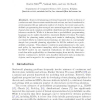Free Online Productivity Tools
i2Speak
i2Symbol
i2OCR
iTex2Img
iWeb2Print
iWeb2Shot
i2Type
iPdf2Split
iPdf2Merge
i2Bopomofo
i2Arabic
i2Style
i2Image
i2PDF
iLatex2Rtf
Sci2ools
155
click to vote
PKDD
2015
Springer
2015
Springer
Planning in Discrete and Continuous Markov Decision Processes by Probabilistic Programming
Real-world planning problems frequently involve mixtures of continuous and discrete state variables and actions, and are formulated in environments with an unknown number of objects. In recent years, probabilistic programming has emerged as a natural approach to capture and characterize such complex probability distributions with general-purpose inference methods. While it is known that a probabilistic programming language can be easily extended to represent Markov Decision Processes (MDPs) for planning tasks, solving such tasks is challenging. Building on related efforts in reinforcement learning, we introduce a conceptually simple but powerful planning algorithm for MDPs realized as a probabilistic program. This planner constructs approximations to the optimal policy by importance sampling, while exploiting the knowledge of the MDP model. In our empirical evaluations, we show that this approach has wide applicability on domains ranging from strictly discrete to strictly continuous t...
Data Mining | PKDD 2015 |
Related Content
| Added | 16 Apr 2016 |
| Updated | 16 Apr 2016 |
| Type | Journal |
| Year | 2015 |
| Where | PKDD |
| Authors | Davide Nitti, Vaishak Belle, Luc De Raedt |
Comments (0)

